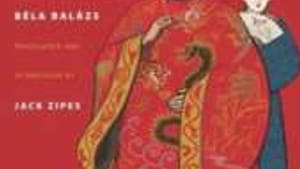Stay in the Loop
BSR publishes on a weekly schedule, with an email newsletter every Wednesday and Thursday morning. There’s no paywall, and subscribing is always free.
Nabokov meets his match
A trio of new poetry translations

Although Balazs wrote fairy tales throughout his career, the tales in The Cloak of Dreams, first published in 1922, had an unusual genesis. Ordinarily an artist is commissioned to illustrate a written work, but in this case Balazs was asked to compose tales to fit a set of drawings by the artist Mariette Lydis, most of which are reproduced in this volume. It's a tribute to Balazs's familiarity with the form that he was able to produce so smooth a set of pastiches that they actually seemed to be German translations of Chinese originals.
Balazs even won an approving nod from the great Thomas Mann, who called his work "a beautiful book" and lauded Balazs's achievement as "remarkable." The Cloak of Dreams makes for great holiday reading, so perhaps we may see more of Balazs translated into English.
Norwid's philosophical poetry
Cyprian Norwid was a Polish poet and artist who is usually referred to a "late Romantic" although he could as easily be called an early Symbolist. He writes dense philosophical poetry, and although he has occasionally been translated, this newest translation seems to have the virtue of most closely approximating his thorny style.
If you take the several translations of Norwid and lay them side by side, you will notice that many of the same poems— Norwid's "greatest hits," as it were— are translated every time. Nevertheless, for a poet as seldom translated as Norwid, that can't matter very much. Any translation is welcome, and this one is pretty good.
Two sides of Nabokov
The great novelist Vladimir Nabokov isn't generally known as a poet, although he has translated works by Pushkin, Lermontov and Tiutchev, as well as the medieval epic, The Song of Igor's Campaign. The first portion of Nabokov's own Pale Fire is, in fact, a long poem.
Here we have a selection of his shorter works— some written in Russian, some in English— composed between 1914 and 1966. The tone of the poems ranges from the pleasantly conversational:
"So then you're Russian? It's the first time
I have met a Russian…"
And the lively, delicately bulging
eyes examine me. "You take your tea
with lemon, I already know.
I also know that you have icons
where you live, and samovars"
to the moody:
Not quite a bed, not quite a bench.
Wallpaper: a grim yellow.
A pair of chairs. A squinty looking glass.
We enter— my shadow and I.
Nabokov's somewhat noir-ish sensibility is beautifully displayed in a poem like Lilith, an erotic idyll that turns into something very, very different.
It's certainly a pleasure to have this new aspect of Nabokov's creativity revealed to us, and Knopf has packaged the text beautifully. This is a volume that belongs on every poetry-lover's bookshelf. (Although, I must say in truth, if you can only purchase one of the three, the Balazs volume is the one to have.)
What, When, Where
The Cloak of Dreams: Chinese Fairy Tales. By Bela Balazs; Jack Zipes, translator. Princeton University Press, 2010. 192 pages; $24.95. books.google.com. Selected Poems. By Cyprian Norwid; Danuta Borchardt, translator. Archipelago Books, 2011. 101 pages; $16. books.google.com. Selected Poems. By Vladimir Nabokov; Dmitri Nabokov, translator, Alfred A. Knopf, 2012. $30. www.amazon.com.
Sign up for our newsletter
All of the week's new articles, all in one place. Sign up for the free weekly BSR newsletters, and don't miss a conversation.
